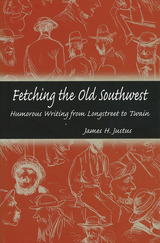2 books by JUSTUS, JAMES H.

Fetching the Old Southwest
Humorous Writing from Longstreet to Twain
James H. Justus
University of Missouri Press, 2004
For more than a quarter-century, despite the admirable excavations that have unearthed such humorists as John Gorman Barr and Marcus Lafayette, the most significant of the humorists from the Old Southwest have remained the same: Crockett, Longstreet, Thompson, Baldwin, Thorpe, Hooper, Robb, Harris, and Lewis. Forming a kind of shadow canon in American literature that led to Mark Twain’s early work, from 1834 to 1867 these authors produced a body of writing that continues to reward attentive readers.
James H. Justus’s Fetching the Old Southwest examines this writing in the context of other discourses contemporaneous with it: travel books, local histories, memoirs, and sports manuals, as well as unpublished private forms such as personal correspondence, daybooks, and journals. Like most writing, humor is a product of its place and time, and the works studied herein are no exception. The antebellum humorists provide an important look into the social and economic conditions that were prevalent in the southern “new country,” a place that would, in time, become the Deep South.
Justus’s study focuses mainly on the humor from the area categorized in the federal censuses of the mid-nineteenth century as the Southwest: Alabama, Mississippi, Louisiana, Kentucky, Tennessee, and, eventually, Arkansas and Texas. Where it is pertinent, he also includes North Carolina and Missouri in this cultural map. Although some of these pieces may not precisely reflect their cultural setting, they are assuredly refractions of it.
While previous books about Old Southwest humor have focused on individual authors, Justus has produced the first critical study to encompass all of the humor from this time period. Teachers and students of literary history will appreciate the incredible range of documentation, both primary and secondary.
[more]

Wilderness
A Tale Of The Civil War
Robert Penn Warren
University of Tennessee Press, 2001
“A moving and disturbing work—one which goes beyond events, to brood upon their meanings.”—Samuel Hynes, New York Times Book Review
In the summer of 1863, Adam Rosenzweig leaves a Bavarian ghetto and sails for the United States to fight for the North in the Civil War. Fired by a revolutionary idealism inherited from his father, he hopes to aid a cause that he believes to be as simple as he knows it to be just.
Over the course of his journey, Adam becomes witness to a world whose complexity does not readily conform to his ideals of liberty. When his twisted foot attracts unwanted attention on his voyage to America, he is threatened with return to Europe. He jumps ship in New York, only to be caught up in the violence and horror of the anti-draft riots. Eventually he reaches the Union Army, serving not as a soldier but as a civilian provisioner’s assistant. Adam’s encounters with others—among them a wealthy benefactor, a former slave, an exiled Southerner, a bushwacker and his wife—further challenge the absolutism that informs his view of the world and of his place in it.
First published in 1961, Wilderness remains a profoundly provocative meditation on the significance of the Civil War and the varieties of human experience. This new edition of the novel includes an insightful introductory essay by James H. Justus, Distringuished Professor Emeritus at Indiana University and author of The Achievement of Robert Penn Warren.
The Author: Robert Penn Warren (1905–1989)was born in Kentucky and studied at Vanderbilt and Oxford Universities. As a novelist, teacher, poet, and critic, he became one of America’s most celebrated men of letters and the only writer to receive Pulitzer Prizes for both poetry and fiction. In addition to Wilderness, his novels included All the King’s Men, World Enough and Time, and Band of Angels.
In the summer of 1863, Adam Rosenzweig leaves a Bavarian ghetto and sails for the United States to fight for the North in the Civil War. Fired by a revolutionary idealism inherited from his father, he hopes to aid a cause that he believes to be as simple as he knows it to be just.
Over the course of his journey, Adam becomes witness to a world whose complexity does not readily conform to his ideals of liberty. When his twisted foot attracts unwanted attention on his voyage to America, he is threatened with return to Europe. He jumps ship in New York, only to be caught up in the violence and horror of the anti-draft riots. Eventually he reaches the Union Army, serving not as a soldier but as a civilian provisioner’s assistant. Adam’s encounters with others—among them a wealthy benefactor, a former slave, an exiled Southerner, a bushwacker and his wife—further challenge the absolutism that informs his view of the world and of his place in it.
First published in 1961, Wilderness remains a profoundly provocative meditation on the significance of the Civil War and the varieties of human experience. This new edition of the novel includes an insightful introductory essay by James H. Justus, Distringuished Professor Emeritus at Indiana University and author of The Achievement of Robert Penn Warren.
The Author: Robert Penn Warren (1905–1989)was born in Kentucky and studied at Vanderbilt and Oxford Universities. As a novelist, teacher, poet, and critic, he became one of America’s most celebrated men of letters and the only writer to receive Pulitzer Prizes for both poetry and fiction. In addition to Wilderness, his novels included All the King’s Men, World Enough and Time, and Band of Angels.
[more]
READERS
Browse our collection.
PUBLISHERS
See BiblioVault's publisher services.
STUDENT SERVICES
Files for college accessibility offices.
UChicago Accessibility Resources
home | accessibility | search | about | contact us
BiblioVault ® 2001 - 2024
The University of Chicago Press









